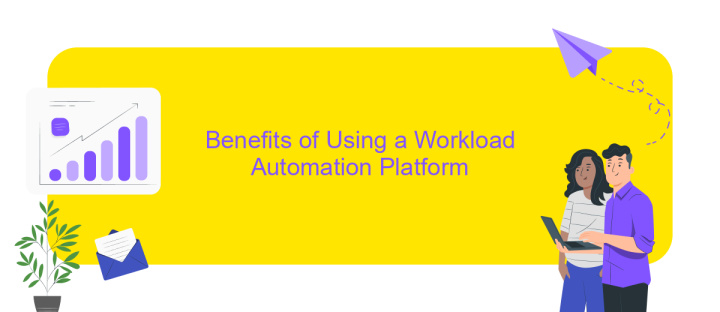Workload Automation Platform Company
In today's fast-paced business environment, managing workloads efficiently is crucial for maintaining a competitive edge. Workload Automation Platform Company specializes in providing cutting-edge solutions that streamline operations and enhance productivity. By automating complex processes, our platform enables businesses to optimize resource allocation, reduce operational costs, and improve overall performance. Discover how our innovative technology can transform your workflow and drive your company towards success.
Introduction
In today's fast-paced digital landscape, businesses are increasingly turning to workload automation platforms to enhance operational efficiency and streamline processes. These platforms are designed to manage and automate a wide range of tasks, from simple repetitive actions to complex workflows, freeing up valuable human resources for more strategic initiatives. As organizations continue to adopt cloud technologies and embrace digital transformation, the demand for robust workload automation solutions is on the rise, driving innovation and competition in the industry.
- Automates repetitive and time-consuming tasks
- Enhances operational efficiency and productivity
- Supports cloud-based and hybrid environments
- Improves accuracy and reduces human error
- Facilitates seamless integration with existing systems
By leveraging the capabilities of a workload automation platform, companies can achieve significant cost savings, improve service delivery, and maintain a competitive edge in their respective markets. As these platforms evolve, they are incorporating advanced features such as artificial intelligence and machine learning, further empowering businesses to optimize their operations and adapt to changing demands with agility and precision.
What is a Workload Automation Platform?

A Workload Automation Platform is a sophisticated tool designed to streamline and manage the execution of various business processes and tasks across different systems and applications. By automating repetitive and time-consuming tasks, these platforms enhance operational efficiency and reduce the risk of human error. They allow organizations to schedule, monitor, and manage workflows in real-time, ensuring that all tasks are completed accurately and on time. This automation is crucial for businesses that need to handle large volumes of data and complex processes, offering scalability and flexibility.
These platforms often include features for seamless integration with existing IT infrastructure, making it easier to unify disparate systems. For instance, services like ApiX-Drive can be integrated to facilitate the automation of data transfers and communication between various applications without the need for extensive coding. This integration capability is vital for businesses looking to enhance connectivity and streamline their operations across different platforms. Ultimately, a Workload Automation Platform empowers businesses to focus on strategic initiatives by freeing up resources previously tied to manual tasks.
Benefits of Using a Workload Automation Platform

Implementing a workload automation platform can significantly enhance operational efficiency by streamlining complex processes and reducing manual intervention. These platforms provide a centralized interface for managing diverse tasks, which helps in minimizing errors and ensuring consistency across operations. As businesses grow, managing workloads manually becomes increasingly challenging, making automation a critical component for scalability and reliability.
- Increased Efficiency: Automation platforms optimize resource utilization, allowing tasks to be completed faster and with fewer resources.
- Error Reduction: By automating repetitive tasks, the likelihood of human error is minimized, leading to more reliable outcomes.
- Scalability: These platforms are designed to handle increased workloads seamlessly, supporting business growth without additional strain on resources.
- Cost Savings: Reducing manual labor and improving process efficiency can lead to significant cost reductions over time.
- Enhanced Visibility: Centralized management provides better oversight and control, enabling quicker decision-making and troubleshooting.
Overall, a workload automation platform not only enhances productivity but also provides a strategic advantage by allowing businesses to focus on core activities rather than routine operational tasks. This shift enables organizations to adapt swiftly to market changes and maintain a competitive edge.
Challenges of Implementing a Workload Automation Platform

Implementing a workload automation platform can be a complex undertaking for organizations, often presenting several challenges. One of the primary hurdles is the integration of the platform with existing IT infrastructure. Legacy systems and diverse applications may require significant customization to ensure seamless operation, which can be both time-consuming and costly.
Another significant challenge is the resistance to change from employees. Transitioning to an automated system can be daunting for staff accustomed to manual processes, necessitating comprehensive training and support to facilitate a smooth adaptation. Without proper guidance, the workforce may struggle to utilize the platform effectively, leading to suboptimal results.
- Compatibility issues with existing software and hardware
- High initial investment and ongoing maintenance costs
- Data security and compliance concerns
- Scalability to accommodate future growth
Despite these challenges, the benefits of a workload automation platform, such as increased efficiency and reduced operational costs, often justify the effort. Organizations must carefully assess their specific needs and potential obstacles to develop a strategic implementation plan that maximizes the platform's advantages while minimizing disruptions.


Conclusion
In conclusion, the advancement of workload automation platforms is transforming how businesses manage their operational tasks. By streamlining processes and reducing manual intervention, these platforms significantly enhance efficiency and productivity across various sectors. As organizations continue to seek solutions that integrate seamlessly with existing systems, the role of automation becomes even more critical in maintaining competitive advantage. The dynamic nature of these platforms allows companies to adapt quickly to changing demands, ensuring that they can scale operations effectively and sustainably.
Moreover, the integration capabilities offered by services like ApiX-Drive further amplify the potential of workload automation platforms. By facilitating seamless connections between disparate systems, ApiX-Drive enables organizations to automate workflows without extensive technical expertise. This not only saves time and resources but also empowers businesses to focus on strategic initiatives rather than routine tasks. As the digital landscape continues to evolve, leveraging such integrative solutions will be key to unlocking new levels of operational excellence and innovation.
FAQ
What is a Workload Automation Platform?
How can a Workload Automation Platform benefit my business?
What types of processes can be automated using a Workload Automation Platform?
How does integration work with a Workload Automation Platform?
Is it difficult to implement a Workload Automation Platform?
Do you want to achieve your goals in business, career and life faster and better? Do it with ApiX-Drive – a tool that will remove a significant part of the routine from workflows and free up additional time to achieve your goals. Test the capabilities of Apix-Drive for free – see for yourself the effectiveness of the tool.

